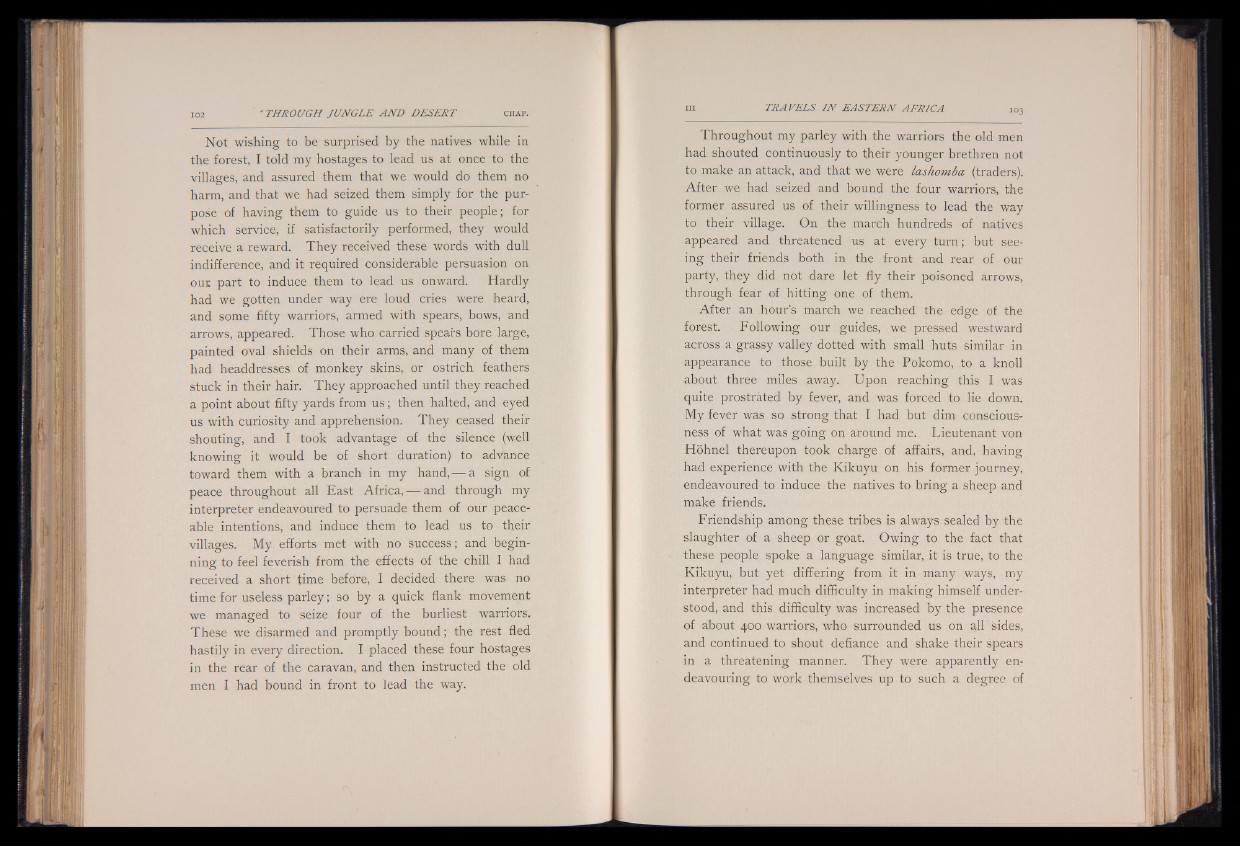
Not wishing to be surprised by the natives while in
the forest, I told my hostages to lead us at once to the
villages, and assured them that we would do them no
harm, and that we had seized them simply for the purpose
of having them to guide us to their people; for
which service, if satisfactorily performed, they would
receive a reward. They received these words with dull
indifference, and it required considerable persuasion on
our part to induce them to lead us oiiward. Hardly
had we gotten under way ere loud cries were heard,
and some fifty warriors, armed with spears, bows, and
arrows, appeared. Those who carried spears bore large,
painted oval shields on their arms, and many of them
had headdresses of monkey skins, or ostrich feathers
stuck in their hair. They approached until they reached
a point about fifty yards from u s ; then halted, and eyed
us with curiosity and apprehension. They ceased their
shouting, and I took advantage of the silence (well
knowing it would be of short duration) to advance
toward them with a branch in my hand, — a sign of
peace throughout all East Africa, — and through my
interpreter endeavoured to persuade them of our peaceable
intentions, and induce them to lead us to their
villages. My efforts met with no success; and beginning
to feel feverish from the effects of the chill I had
received a short time before, I decided there was no
time for useless parley; so by a quick flank movement
we managed to seize four of the burliest warriors.
These we disarmed and promptly bound; the rest fled
hastily in every direction. I placed these four hostages
in the rear of the caravan, and then instructed the old
men I had bound in front to lead the way.
Throughout my parley with the warriors the old men
had shouted continuously to t,heir younger brethren not
to make an attack, and that we were lashomba (traders).
After we had seized and bound the four warriors, the
former assured us of their willingness to lead the way
to their village. On the march hundreds of natives
appeared and threatened us at every turn; but seeing
their friends both in the front and rear of our
party, they did not dare let fly their poisoned arrows,
through fear of hitting one of them.
After an hour’s march we reached the edge of the
forest. Following our . guides, we pressed westward
across a grassy valley dotted with small huts similar in
appearance to those built by the Pokomo, to a knoll
about three miles away. Upon reaching this I was
quite prostrated by fever, and was forced to lie down.
My fever was so strong that I had but dim consciousness
of what was going on around me. Lieutenant von
Hohnel thereupon took charge of affairs, and, having
had experience with the Kikuyu on his former journey,
endeavoured to induce the natives to bring a sheep and
make friends.
Friendship among these tribes is always sealed by the
slaughter of a sheep or goat. Owing to the fact that
these people spoke a language similar, it is true, to the
Kikuyu, but yet differing from it in many ways, my
interpreter had much difficulty in making himself understood,
and this difficulty was increased by the presence
of about 400 warriors, who surrounded us on all sides,
and continued to shout defiance and shake their spears
in a threatening manner. They were apparently endeavouring
to work themselves up to such a degree of